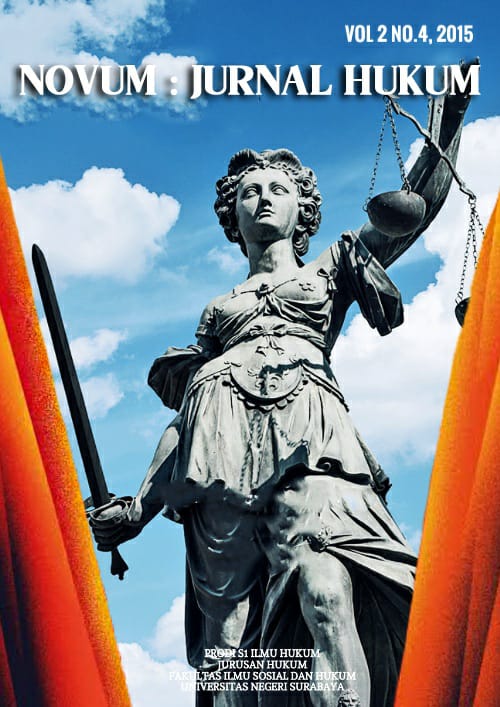CACAT KEHENDAK DALAM PERJANJIAN JUAL-BELI (Analisis Putusan Mahkamah Agung Republik Indonesia Nomor 472 K/ PDT/ 2012)
DOI:
https://doi.org/10.2674/novum.v2i4.17232Abstract
Suatu perjanjian harus dibuat berdasarkan pada syarat-syarat keabsahan perjanjian yang telah diatur dalam Kitab Undang-Undang Hukum Perdata (KUHPerdata). Salah satu syarat sahnya adalah adanya sepakat antara para pihak yang akan terikat dalam perjanjian tersebut. Kata “sepakat” ini bukan hanya dalam ucapan saja, namun memiliki berbagai aspek penting, yakni mengenai kehendak. Apabila terdapat cacat kehendak, maka perjanjian tersebut dapat berakibat batal. Adapun tujuan dari penelitian ini adalah untuk mengetahui, menganalisis dan memahami mengenai Putusan Mahkmah Agung Republik Indonesia Nomor 472 K/ Pdt/ 2012 telah tepat atau tidak jika dikaitkan dengan aturan Pasal 1320 dan Pasal 1321 KUHPerdata tentang syarat keabsahan perjanjian. Jenis penelitian adalah normatif, yang dilakukan dengan beberapa pendekatan yakni pendekatan undang undang (statute approach) dan pendekatan kasus (case approach). Bahan hukum yang digunakan dalam penelitian ini terdiri dari bahan hukum primer dan bahan hukum sekunder. Pengumpulan bahan hukum menggunakan teknik studi kepustakaan dan analisis bahan hukum menggunakan teknik preskriptif. Berdasarkan hasil penelitian dapat diketahui bahwa Majelis Hakim kurang dalam penerapan hukum yakni tidak memberikan pertimbangan mengenai adanya cacat kehendak dalam perjanjian jual beli antara Penggugat dan Tergugat serta tidak memberikan pertimbangan bahwa perjanjian tersebut tidak sesuai dengan ketentuan Pasal 1320 Kitab Undang-Undang Hukum Perdata. Dalam Putusan mahkamah Agung Nomor 472 K/ Pdt/ 2012 tersebut terdapat pendapat berbeda (dissenting opinion) dari sesama Hakim yang memutus perkara tersebut namun dissenting opinion tersebut tidak digunakan dalam menjatuhkan putusan.
Kata Kunci: Perjanjian, Cacat Kehendak, Putusan Mahkamah Agung
Abstract
In the made of an agreement must be based on terms of the validity of the agreement that has been arranged in Burgerlijk Wetboek (The Book of Civil Law). One of the requirements validity of it is there must be an agreed between the parties that will be bound in the agreement. The agreed must has a various important aspect, it’s about the will of the parties. If there was a defective will in a agreement, the agreement can be void. The purpose of this research is to find out is The Decision of the Supreme Court Republic of Indonesia 472 K/ Pdt/ 2012 has been appropriate if linked to the rules Article 1320 and 1321 of The Book of Civil Law. Article about the terms of validity of the agreement, which rejected a petition for cassation of a plaintiff upon the petition for annulment suit purchase agreement that contain the defect of the will in it, which was made when one of the parties under a pressure.This research is a normative research with statute approach and case approach. The legal materials used are primary legal material and secondary legal material. The analysis is by processing the primary legal materials assistance to the theory obtained from the secondary legal materials. Based on the research it can be seen that the judge in lacking the rule of law is not provide the consideration about the existence of defect of the will in purchase agreement between the plaintiff and the defendant. They did not consider that the agreement violated Article 1320 The Book of Civil Law. In Decisions of Supreme Court 472 K/ Pdt/ 2012 there’s a dissention opinion from another judge but that dissenting opinion was not used in dropped decisions.
Keywords: Agreement, Defect of the Will, The Supreme Court Decisions
Downloads
 Abstract views: 436
,
Abstract views: 436
, PDF Downloads: 350
PDF Downloads: 350



